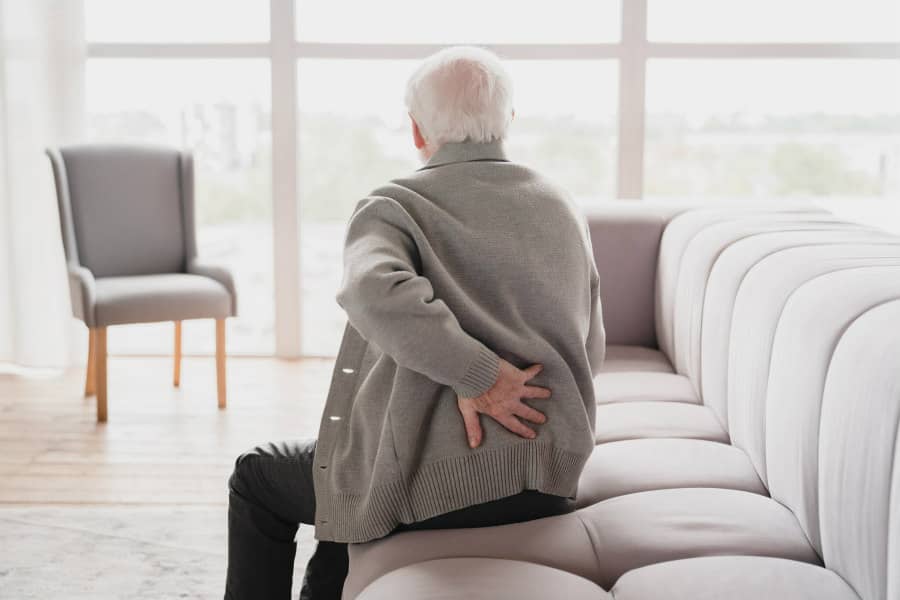As we age, our bodies undergo inevitable changes, and one of the most noticeable shifts is in a person’s mobility.
For the elderly, maintaining mobility can become a real challenge. In this blog, we'll explore the indicators of mobility issues in the elderly, the underlying causes, preventive measures, and ways to offer support.
Recognising Mobility Warning Signs
There are numerous early warning signs that may indicate a mobility issue. Keep an eye out for these signs, as early detection can make a difference to longer term health and wellbeing.
- Balance Problems
Instances of stumbling or an increased reliance on walls or furniture for support may indicate an issue with their balance. - Muscle Weakness
Struggling to perform daily tasks that were once easy, like standing up from a chair or climbing stairs. - Difficulty Walking
Noticeable changes in gait, such as shuffling, limping, or a slower pace. - Joint Pain
Persistent discomfort in the knees, hips, or other joints that hinder movement and indicate underlying issues. - Falls or Fear of Falling
Several falls or a noticeable fear of falling or reluctance to engage in activities that were previously enjoyed. You can ask your GP to be referred to a Falls Clinic for further support. - Hygiene & cleanliness
A visible change in personal care and the tidiness of the house may indicate that there may be physical problems doing everyday tasks.
The Causes of Mobility Issues in the Elderly.
Mobility issues in the elderly can stem from several factors:
- Muscle Loss
With age, there is a natural decline in muscle mass and strength, leading to decreased mobility. - Joint Problems
Conditions such as osteoarthritis can cause pain and stiffness, in turn impairing movement. - Neurological Changes
Degenerative diseases like Parkinson's can affect balance and coordination. - Cognitive Issues
Conditions such as Alzheimer’s can impact an individual’s ability to plan, make decisions and move safely. In the later stages movement can also be severely impacted. - Chronic Health Conditions
Diabetes, heart disease, and obesity can exacerbate mobility problems due to their impact on overall health. - Vision & Hearing Impairment
Declines in vision and hearing can make it difficult to move around safely, increasing the risk of falls. - Medication Side Effects
Some medications can cause dizziness, weakness, or other side effects that then affect mobility.
Preventing Mobility Issues
While some aspects of aging are inevitable, there are steps individuals can take to maintain mobility and independence. These include:
Regular Exercise
Engaging in activities that promote strength, balance, and flexibility, such as walking, swimming, or tai chi, can help preserve mobility. New Age Care now offer a monthly exercise class to help with mobility. Please contact the office on 0808 808 5000 for more information.
Healthy Diet
A nutritious, varied diet rich in vitamins, minerals, and protein supports muscle health and overall well-being.
Regular Check-ups
Routine visits to healthcare professionals can help monitor and address any emerging health issues before they impact mobility.
Medication Management
Reviewing medications with a doctor to minimise side effects is crucial for maintaining mobility.
Home Adaptions
Making changes to the home such as clearing clutter and removing tripping hazards can help with mobility and reduce the risk of falls.
Supporting someone with Mobility Issues
If you notice signs of mobility issues in an elderly loved one, here is how you can assist them:
Offer Support
Talk to them about their abilities and offer support where needed. Allow them to maintain their independence by encouraging them to engage in activities they can manage safely.
Assistive Devices
Introduce aids such as walking sticks, wheelchairs, or mobility scooters if needed, and ensure they are trained in their use.
Home Modifications
Adjust the home, such as installing ramps or handrails, to facilitate safe and independent movement.
Provide Transportation
Offer to drive them to appointments or accompany them on outings to ensure they can participate in activities outside the home.
Outside Assistance
It may come to a point where extra assistance is needed with daily tasks or getting around. Hourly visiting care is a great option as it allows a person to stay in their own home with familiar surroundings. For more information about New Age Care’s Hourly Care visit our page here .
Identifying Mobility Issues in the Elderly
Recognising the warning signs of mobility issues in the elderly is crucial for ensuring their well-being and quality of life. By understanding the causes, taking preventive measures, and offering support, we can help our elderly loved ones navigate the challenges associated with ageing and maintain their independence for as long as possible.


